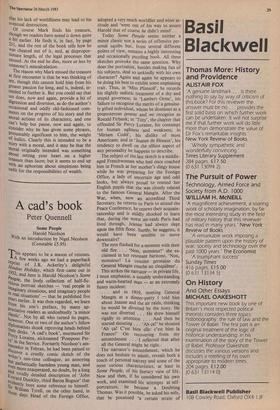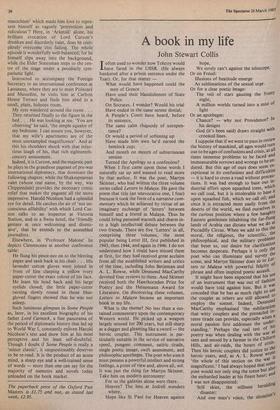A cad's book
Peter Quennell
Some People Harold Nicolson With an introduction by Nigel Nicolson (Constable £5.95)
Ihis appears to be a season of reissues. A few weeks ago we had a paperback rePrint of J.R. Ackerley's delightful libido° Holiday, which first° came out in
1932; and here is Harold Nicolson's Some peopi
ge, the lively collection- of half-fic- titious portrait sketches — 'real people in i,tdaginary situations, and imaginary people M real situations' — that he published five Yfears earlier. It was then regarded, we learn r°M his son's preface, by many ap- Preciative readers as undoubtedly 'a minor classic'. Not by all who turned its pages, 40wever. One or two of the author's fellow diPloMatists shook reproving heads behind their desks. `A cad's book', murmured Sir ercY Loraine, nicknamed 'Pompous Per-
in the Service. Formerly Nicolson's am- 0.assador in Tehran, he had been pained to discover a cruelly comic sketch of the Writer's one-time colleague, an annoying eb,,Itt Pathetically harmless young man, and 'en more exasperated, no doubt, by a long a„nd vividly detailed description of 'John :,Verard Dunkley, third Baron Bognor' that
s‘:IdentlY bore some reference to himself. thir °se days Head of the Foreign Office,
William Tyrell, on the other hand, in adopted a very much worldlier and wiser at- titude and `went out of his way to assure Harold that of course he didn't mind'.
Today Some People seems neither a minor classic nor a series of offensive per- sonal squibs but, from several different points of view, remains a highly interesting and occasionally puzzling book. All these sketches provoke the same question. Why does the portraitist, besides making fun of his subjects, deal so unkindly with his own character? Again and again he appears to be doing his best to exhibit some unpleasing trait. Thus, in `Miss Plimsoll', he records his slightly sadistic treatment of a shy and stupid governess; in 'Lambert Orme', his failure to recognise the merits of a genuine- ly gifted individual, whom he dismisses as a preposterous poseur and we recognise as Ronald Firbank; in `Titty', the chapter that offended Sir Percy Loraine, his contempt for human ugliness and weakness; in 'Miriam Codd', his dislike of most Americans; and in 'Jeanne de Henaut', his tendency to dwell on the silliest aspect of any personality he happens to describe.
The subject of the last sketch is a middle- aged Frenchwoman who had once coached him in French at her mother's dingy house while he was preparing for the Foreign Office, a lady of uncertain age and odd looks, but always proud to remind her English pupils that she was closely related to the famous General Mangin. After the War, when, now an accredited Third Secretary, he returns to Paris to attend the Peace Conference, he renews their acquain- tanceship and is mildly shocked to learn that, during the worst air-raids Paris had lived through, Jeanne had always slept upon the fifth floor. Surely, he suggests, it would have been sensible to move downstairs?
The eyes flashed for a moment with their old fire . . . 'Non, monsieur!' she ex- claimed in her resonant baritone, 'Non, monsieur! La cousine germaine du General Mangin couche au cinquieme'. This strikes the narrator — in private life, I must emphasise, a notably understanding and warm-hearted man — as an extremely funny incident:
. . . and in 1919, meeting General Mangin at a dinner-party I told him about Jeanne and the air raids, thinking he would be diverted by the story. He was not diverted . , He drew himself rigidly to attention . . And then he started shouting. . ‘Ah ca!' he shouted `Ah ca! C'est bien elle: c'est bien la France!' On recovering from my astonishment . . . I reflected that after all the General might be right.
The narrator's astonishment, which he does not hesitate to admit, reveals both a touch of personal naivety and some of the most curious characteristics, at least in Some People, of his literary view of life. Now and then, if he considered his own work, and examined his attempts at self- portraiture, he became a Doubting Thomas. Was it possible, he asked his wife, that he possessed 'a certain strain of
masochism' which made him love to repre- sent himself as vaguely 'pretentious and ridiculous'? Here, in 'Arketall' alone, his brilliant evocation of Lord Curzon's drunken and disorderly valet, does he com- pletely overcome this failing. The whole episode is wonderfully well-balanced; for he himself slips away into the background, while the Elder Statesman steps to the cen- tre of the stage under a peculiarly sym- pathetic light.
Instructed to accompany the Foreign Secretary to an international conference at Lausanne, where they are to meet Poincare and Mussolini, he visits him at Carlton House Terrace and finds him abed in a small, plain, hideous room.
My eyes wandered around the room . They returned finally to the figure in the bed . . . He was looking at me. 'You are observing' he said, 'the simple squalor of my bedroom. I can assure you, however, that my wife's apartments are of the most unexampled magnificence'. And at this his shoulders shook with that infec- tious laugh of his, that rich eighteenth- century amusement.
Indeed, it is Curzon, and the majestic part he plays in the grandiose pageant of pre-war international diplomacy, that dominate the following chapter; while the Shakespearean valet (whose real name, by the way, was Chippendale) provides the necessary comic relief that makes the pageant all the more impressive. Harold Nicolson had a splendid eye for detail. He catches the air of 'not un- conscious affability' with which Lord Cur- zon talks to an inspector at Victoria Station, and in a Swiss hotel, the 'friendly gesture at once welcoming and dismis- sive', that he extends to the assembled journalists.
Elsewhere, in 'Professor Malone' he depicts Clemenceau at another conference table: He flung his pince-nez on to the blotting paper and sank back in his chair. . . His lavender cotton gloves were joined in front of him clasping a yellow ivory paper-cutter the exact colour of his face. He leant his head back and his large eyelids closed; the little paper-cutter turning slowly round in those blue- gloved fingers showed that he was not asleep.
Such luminous glimpses in Some People as, later, in his excellent biography of his father Lord Carnock, a fine panorama of the period of diplomatic history that led up to World War I, constantly enliven Harold Nicolson's text and show him at his most perceptive and his least self-doubtful. Though I doubt if Some People is really a 'minor classic', it unquestionably deserves to be re-read. It is the product of an acute mind, a sharp eye and a well-trained sense of words — more than one can say for the majority of memoirs and novels today unloaded on the book market.















































 Previous page
Previous page